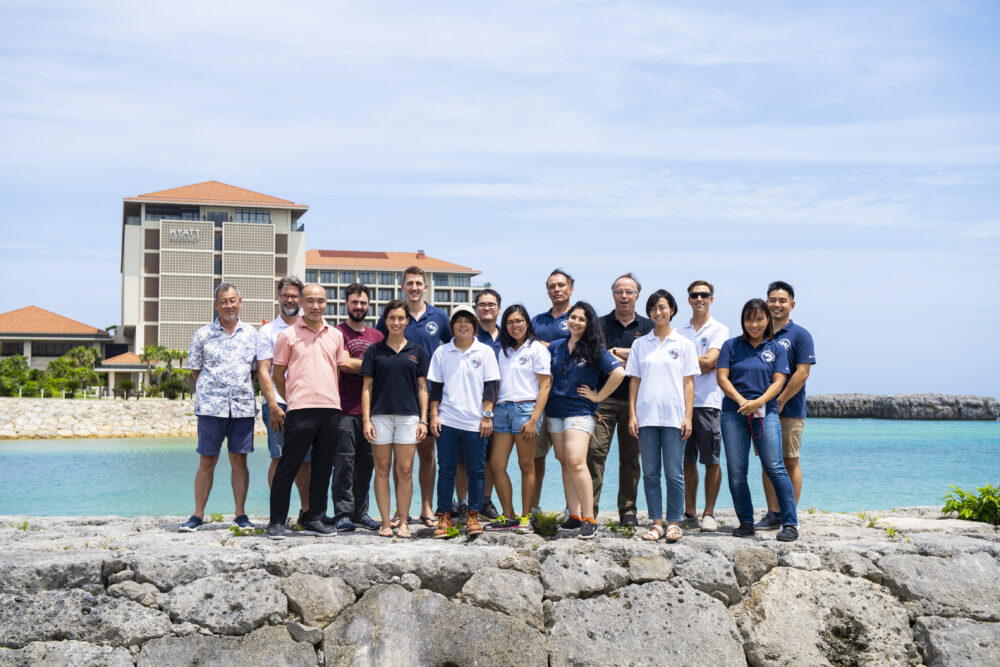OIST の海洋気候変動ユニットとは What is OIST’s Ocean Climate Change Unit?

本プロジェクトをサポートしてくれている、沖縄科学技術大学院大学(OIST)の海洋気候変動ユニットを紹介します。
沖縄科学技術大学院大学(OIST)は、世界レベルの研究教育を行う国際的な大学院大学として、2011年に設立されました。科学技術の多分野に渡り、分野の壁のない学際的な研究を推進していますが、海洋科学についても世界水準の環境を構築しています。ハイアット瀬良垣に程近い場所にある「OIST マリン・サイエンス・ステーション」には世界中からトップレベルの科学者が集まり、現在9つの研究ユニットが海洋に関する幅広いテーマを研究しています。
そのうちのひとつ、海洋気候変動ユニットでは、気候変動・熱波・乱獲・都市化などの環境の変化にサンゴ礁の生き物たちがどのように適応しているかを明らかにする研究を行っています。二酸化炭素産出量の増加により、地球の海洋は温暖化や酸性化が進み、異常気象が頻発、長期化する事態になっています。温度の急上昇による影響を受けやすいサンゴ礁の生き物を研究することは、気候変動が生態系や世界経済に与える影響を予測するうえで非常に重要です。
海洋気候変動ユニットでは、カクレクマノミなど複数の魚種を研究対象としており、研究室内の水槽で地元で採取された野生のペアから生まれた魚たちを数世代にわたって飼育しています。本プロジェクトでは、2021年度の取り組みとして、OIST マリン・サイエンス・ステーションで育てられたカクレクマノミ幼魚20匹(10ペア)を放流し、自然界での繁殖による自立した個体群の形成に貢献することを目指しています。
海洋気候変動ユニットは2019年9月に発足、現在は博士過程学生を含めて14名のメンバーで構成されています。10カ国から集まった、国際色豊かなチームです。海洋気候変動ユニットを率いるティム・ラバシ教授は、本プロジェクトについて、「ハイアット リージェンシー 瀬良垣アイランド 沖縄の方々や沖縄観光コンテンツ開発支援事業の支援とともに、このプロジェクトに参加できることを大変嬉しく思います。カクレクマノミは、美しい沖縄のサンゴ礁生態系に非常に重要な役割を果たし、また沖縄観光にとっても重要です。このプロジェクトにより、健全で豊富なカクレクマノミのコミュニティを確保することで、これらの両方を支援できることは光栄です」と述べています。
(写真は本プロジェクトに関わるOIST海洋気候変動ユニット、海洋生態進化発生生物学ユニット、マリン・サイエンス・ステーションのメンバー。)
We would like to introduce the Ocean Climate Change Unit at Okinawa Institute of Science and Technology Graduate University (OIST), which supports this project.
Okinawa Institute of Science and Technology Graduate University (OIST) was established in 2011 as an international graduate university that provides world-class research and education. We are promoting interdisciplinary research across many fields of science and technology, without disciplinary barriers, and we are also building a world-class environment for marine science. OIST Marine Science Station, located near the Hyatt Seragaki, attracts top scientists from all over the world, and currently has nine research units conducting research on a wide range of ocean-related themes.
One of these, the Marine Climate Change Unit, conducts research to clarify how coral reef creatures are adapting to environmental changes such as climate change, heat waves, overfishing, and urbanization. Due to increased carbon dioxide production, the Earth’s oceans are becoming warmer and more acidic, leading to more frequent and prolonged abnormal weather events. Studying coral reef life, which is sensitive to the effects of temperature spikes, is critical to predicting the impact of climate change on ecosystems and the global economy.
The Marine Climate Change Unit researches multiple fish species, including clownfish, and raises the fish from locally collected wild pairs in laboratory aquariums over several generations. This project aims to release 20 young clownfish (10 pairs) raised at the OIST Marine Science Station as an initiative in 2021, contributing to the formation of an independent population through reproduction in the natural world. Masu.
The Ocean Climate Change Unit was launched in September 2019 and currently consists of 14 members, including doctoral students. We are an international team from 10 countries. Professor Tim Labasi, head of the Marine Climate Change Unit, said of the project, “We are very pleased to be able to participate in this project together with the people of Okinawa and the Okinawa Tourism Content Development Support Project. “They play a vital role in Okinawa’s coral reef ecosystem and are also important to Okinawa tourism. We are proud to support both of these by ensuring a healthy and abundant clownfish community with this project.” states.
(Photo shows members of the OIST Marine Climate Change Unit, Marine Ecology, Evolution and Developmental Biology Unit, and Marine Science Station who are involved in this project.)
